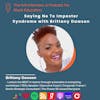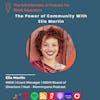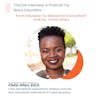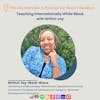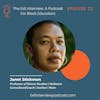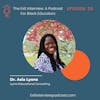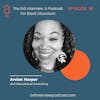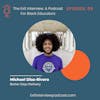
Episode 34: Supporting Black Women Educators with Deidra Fogarty
In this episode, host Dr. Asia Lyons and fellow educator Kevin Adams have an insightful conversation with former educator turned full-time entrepreneur, Deidra Fogarty. Deidra shares her journey, beginning as a teacher, and transitioning into leadership roles within the education system, only to later face toxic environments and bias. As a response to these challenges, she eventually left traditional educational settings and founded an organisation, 'Black Girls Teach', to foster and support black women educators personally and professionally. Along with highlighting issues concerning black educators within the system, she also emphasizes shifting from bias and focusing on the empowerment and development of black women educators. The importance of listening, reassessing oneself, building confidence, and giving space to black women educators forms the core of Deidra's discussion during this insightful and candid conversation.

In this episode, host Dr. Asia Lyons and fellow educator Kevin Adams have an insightful conversation with former educator turned full-time entrepreneur, Deidra Fogarty. Deidra shares her journey, beginning as a teacher, and transitioning into leadership roles within the education system, only to later face toxic environments and bias. As a response to these challenges, she eventually left traditional educational settings and founded an organisation, 'Black Girls Teach', to foster and support black women educators personally and professionally. Along with highlighting issues concerning black educators within the system, she also emphasizes shifting from bias and focusing on the empowerment and development of black women educators. The importance of listening, reassessing oneself, building confidence, and giving space to black women educators forms the core of Deidra's discussion during this insightful and candid conversation.
First of all.... have you signed up for our newsletter, Black Educators, Be Well? Why wait?
Amidst all the conversations about recruiting Black educators, where are the discussions about retention? The Exit Interview podcast was created to elevate the stories of Black educators who have been pushed out of the classroom and central office while experiencing racism-related stress and racial battle fatigue.
The Exit Interview Podcast is for current and former Black educators. It is also for school districts, teachers' unions, families, and others interested in better understanding the challenges of retaining Black people in education.
Please enjoy the episode.
Peace out,
Dr. Asia Lyons and Kevin Adams
Deidra Fogarty: [00:00:00] I started working on Black Girls Teach while I was teaching just because I was meeting people like Tiffany and other folks throughout my career at all the different schools that I worked at. And I was finding that, like, there wasn't a lot of, like, I would meet somebody here and there and there, and I'm like, how do I bring us all together as Black women educators?
How do I start to create a community where Black women educators, where we can really grow? And that's what it started from. And then it really evolved into creating, like, a full blown company. Where we are today, we provide spaces for Black women educators to be able to grow both personally and professionally.
Dr. Asia Lyons: Amidst all of the conversation about recruiting Black educators, where are the discussions about retention? The Exit Interview podcast was created to elevate the stories of Black [00:01:00] teachers, professors, counselors, social workers, and administrators who have been pushed out of the traditional education space.
My cohost, Kevin Adams, and me, Dr. Asia Lyons, are on a mission with our guests to inform school districts, teachers unions, families, students, educators, and others interested in understanding the challenges of retaining Black people in education. Welcome to The Exit Interview, a podcast for Black educators.
Welcome back to The Exit Interview, a podcast for Black educators. Kevin. It's been a minute.
Kevin Adams: Yes, it's been a minute. It's been a minute. Definitely. Definitely. How you
Dr. Asia Lyons: been, Aisha? I was gonna ask you the same thing. I cannot complain. It's winter break right now for educators here, as you know, because you're in the middle of it.
Sun's out. It's Colorado. How have you been? I'm
Kevin Adams: good. I'm doing really good. Overall. All things considered, I'm doing [00:02:00] very well.
Dr. Asia Lyons: That's awesome. So we have a new guest today, Deidre Fogarty. Let's read a little bit about her. So Deidre is a native of Bridgeport, Connecticut, brings more than 15 years of valuable experience to the field of education.
Through her career, she has served in various roles, including educator, literacy coach, assistant principal, and consultant. Recognizing a significant gap in urban education, especially concerning the support and development of Black women educators, Dietra took a proactive step. She founded Black Girls Teach.
A consulting boutique dedicated to providing affinity spaces and leadership development tailored to Black women educators. In addition to her work with Black Girl Teach, Deidre is a sought after speaker on topics related to urban school reform. Furthermore, she actively coaches educators who are venturing into launching their consulting businesses, empowering them to become part of the solution.
Deidre's multifaceted [00:03:00] approach Reflects her commitment to addressing challenges within the education system and fostering leadership among black women educators. Welcome to the show,
Deidre. Thank you. Thank you all for having me. It's good to be here. Yeah, glad to see you here.
Dr. Asia Lyons: So Kevin, I didn't tell you the backstory.
So I'm speaking at South by Southwest. I'm scrolling through all the folks who are speaking. And I saw Deidre's topic and I said, Oh my gosh, I have to meet her. And so I'm just like chit chatting like, Hey, you know, thank you for meeting with me. And we're talking and I'm back on the Instagrams. And I'm like, well, let me just look up and see what she's up to.
How many followers do you have, Deidre?
On our Black Girls Teach page, we have about 40, 000 followers on that page.
Dr. Asia Lyons: 40, 000. So I'm like, oh, if you need any help, girl, I'm like, you don't need no help. That just let you know something. Well, I'm glad you're doing good work. I'm following you on [00:04:00] there. So we'll get into how people can follow you and contact you towards the end, but so glad to have you on the show.
We'll just jump right into the questions. Tell us, how did you get into becoming an educator? What's your story?
Deidra Fogarty: When I was in high school, I was one of those people that kind of felt like I wanted to be a teacher. It was just something that I, like, just kind of came to me, but then I started to engage in experiences.
Like, my school had a young educator society, which I don't even know if schools have that anymore, but my high school had that. It was putting us, like, I started working at a daycare center and things like that. And then I worked at an after school program. And I really started to feel like, wow, like I'm really good at this.
And I had never really felt like I was really good at something. I always thought I was kind of like average at things, but I found when I worked at the afterschool program, like I was getting a lot of really just positive feedback and just feeling like, wow, [00:05:00] like maybe I really should become a teacher.
And so did different things in high school to like, prepare myself to be a teacher. Cause I was like, I'm becoming a teacher. Then went on to university of Connecticut and I applied into their education program my sophomore year, and then I got into the program. And so it was a five year program where I got my bachelor's and my master's degree.
And being from Connecticut, you know, Bridgeport, Connecticut is surrounded by a lot of wealth. And it is not a city that has a lot of wealth, or like the folks in the city, we didn't get the wealth. Maybe it's somewhere in there, but it's surrounded by a lot of like predominantly white, wealthy cities. And so growing up, I had always noticed the differences between My experience in schools versus what people in the town next door, their experiences were very different, the opportunities.
And so I feel like that's where like just some of the drive started to come. But when I actually [00:06:00] started engaging in the program at UConn, they intentionally placed us in different types of environments, rural, suburban, urban. Until we actually did the student teaching, which is like in our senior year, and I really got a chance to just see how it was just so different, you know, the suburban wealthy communities versus a rural community versus the urban community.
And it opened up my eyes and really just solidify, like, yes, this is what I want to do, and I want to work in a community where I want to work with predominantly black and brown students. And I didn't want to be in this place where I was the only Black teacher. So that to me was like, I need to get out of Connecticut.
Because Connecticut, while we do have Black and brown students, it's oftentimes, you know, the teachers don't reflect that. And you're one of the only at the time. And so after I graduated from college, I said, you know what? I'm going to become a teacher, obviously, but I'm going to be a teacher where [00:07:00] there are going to be other black teachers.
So I ended up moving to Baltimore and that's where I started my career as a teacher. So that's a little bit of my story.
Dr. Asia Lyons: So you moved, started in Baltimore and you said in your bio that you had a little bit of all types of jobs within education. So tell us about a little bit of all the things. Um, how long you were in teaching.
We love the details.
Deidra Fogarty: Yeah. So I started in 2006, like in Baltimore, um, started as a second grade teacher there, Baltimore city public schools. And again, it was just experiencing real education now. Like I was in it. I was in education for real as a teacher and starting to see all of the different things that came with that.
And from there I ended up going into, worked as a fifth grade teacher. And then a sixth grade teacher. So I went from second grade to middle school, just wanting to try something different in a different district in Maryland. And then eventually went [00:08:00] into coaching and really feeling like, okay, this is what I'm going to do.
I'm going to be a coach. Then I'm going to be a school leader. Then I'm going to be a superintendent. And I just had this big old plan. I, that's what I said I was going to do. And I had a lot of people that. Like, would tell me, they see me as that. And so when I finally became an assistant principal, it was just a horrible experience.
Not anything to do necessarily with the school, the students, the staff. I just worked under a principal that just wasn't, just wasn't trying to really work with me. And that was my first experience in leadership. And it was just extremely toxic. It was extremely just not how I envisioned it to be. And it was the first time that I felt like, wow, like, okay, maybe I'm not good at this, even though I had always heard that I was.
But it was extremely toxic leadership and it shifted my career. So after that, after I was a school leader, I was like, okay, maybe I'm not [00:09:00] supposed to be a school leader. So in this capacity, so I went back and went into coaching back into being a literacy coach. And, you know, in my mind, I'm like, Oh, well, I'm taking a step down because I was just school leader.
Now I'm a coach. Like what's going on? And, you know, it was going good again. And in that role, I ended up being like an interim vice principal because somebody went on maternity leave and then the principal left. So like the last six months A school year, I was the interim assistant principal, but still, I was like, you know what I want to go back, you know, I'll be a coach going back.
So I went into my coach role again. New leadership came in, completely just changed everything in the school, and then it started to become another toxic environment. And I started to feel those feelings that I felt when I was at the previous toxic environment. And I was like, How do you coach teachers?
And In a toxic environment, like everything I say as a coach really doesn't matter if the principal is saying something totally different. [00:10:00] So at that point I was just like, I don't know if I want to do this because it was just causing a lot of stress. My teachers, while they love me coaching, they would be like, Fogarty, you know, I hear everything you're saying, but it seems like everybody else is just doing the opposite.
And it's like, we're trying to do the right thing. And it was just a disconnect between what leadership was talking about versus what we should be doing as educators. So I quit, I quit mid year. And that was the first time I had ever like quit a job, you know? And I was like, I'm out of here. And I went back into the classroom.
I said, I just don't like, this is not how it's supposed to be. And I felt like it was starting to make me very, very, very negative. And so I went back into the classroom and that was when I started like the final leg of my education tour, where I was a special education teacher. I had already been like certified for, I just never had done it.
And then that was just such a great experience because I felt like [00:11:00] it allowed me to truly, really be a master educator. But also it gave me a little bit more of the space to. Work on my business, because I was starting to build my business at the time and I was able to just have more mental clarity because it just kind of came naturally to me and eventually ended up in a self contained classroom as a special education teacher with students who had severe disabilities, autism, developmental delays, and that's where I left off when we went into COVID, that's where I was at, and I had worked at, over the course of my career, seven different schools.
So I am a school hopper and I have a philosophy about that that just like came to me yesterday when I talked to another school hopper. But that's where I ended. My last role was as a special education teacher in a self contained classroom. Peer professionals that I absolutely adored. So yeah, that's what it was.
That's what it was.
Kevin Adams: Wow. I mean, first of all, shout [00:12:00] out doing the work, doing the work, moving through it. You know, as I said, I moved into an assistant principal position. Luckily, I feel like I've been blessed with strong, positive leadership. So it is felt good for me, but I can see how like having a toxic leader could make it a really negative experience and just, you know, make you question it all.
You know, and I like to joke when people ask me how it's going, I'm like, Oh, I'm not looking at teaching jobs. I'm not, I'm not going back yet, but sticking with it. But I think one thing that strikes me by your story, Asia and I, we both teach, our education careers are in Colorado, you know, predominantly white state and teaching is predominantly a white endeavor in Denver public schools, you know, throughout the state.
In our interviews with a lot of people here in Denver, they talk about racial battle fatigue. As being one [00:13:00] of the things that pushes them out of the classroom, out of education, you know, you're teaching predominantly with black educators. Can you tell us, like, about how that impacts, impacted your educational journey, your experience and ultimate desire?
I mean, I would love to know what race those principles
Deidra Fogarty: were. Oh, well, that's what I was just about to say. I mean, yes, definitely taught with predominantly Black educators, educators of color. In the beginning of my career, my leadership was predominantly Black when I was in the beginning stages of it. But actually when I transitioned into these different types of toxic environments.
A lot of times the leadership was not black. Sometimes they were right, but sometimes their bosses were oftentimes not black. So a lot of the executive level leaders in this particular area, while we do definitely have, you know, black leaders and leaders of color, we [00:14:00] oftentimes do have executive level leaders who are over principles who are predominantly white.
And leading school districts that have predominantly black students. And so that was a part of my experience. So I had a range, but I definitely have been in spaces where certain things would happen that I would feel like were not in the best interest of our black students. And it was kind of just like, well, you know, this is just how we do things here.
This is just what it is. Right. And so, yeah, it was a lot of that type of thing. And even from sometimes when you are a black leader in those type of environments. You have someone else that you have to adhere to the way they're doing things. And so sometimes these types of very toxic practices are passed down.
And I've also been in spaces where things that don't [00:15:00] align in terms of, and I don't know what the exact term of it is called, but like, you know, how there was a lot of times we talk about how white supremacy shows up in the workplace. And a lot of people reference. what that can look like, white supremacy workplace culture.
And I saw a lot of that, even in spaces that were led by black leaders, right? So because sometimes when we adhere to certain norms, the people that are adhering to that dominant cultural norm are the ones who become leaders sometimes. And so that becomes perpetuated no matter who is leading, no matter what color they are, those norms are going to be perpetuated.
And that's a lot of what I saw is a lot of what I saw.
Kevin Adams: I think that's a really important point. I like the idea of how white supremacist culture is ingrained, right? And it's not just, again, that you just have a black leader, Brown leader. It's that some of these [00:16:00] same. leaders, you know, they've grown up in white supremacist schools and culture and society.
And so You really reflect it, and that's how you kind of guide your leadership.
Dr. Asia Lyons: Yeah, I want to add a little bit to that. We've had so many folks on this show who talk about that, that they didn't necessarily have a white leader, but there were folks of color who were just pushing the agenda of white supremacy culture.
Kevin knows that I say all the time that every Black person in Selma didn't march. There always are going to be folks who are going to turn their head or turn an eye away from harm, just for the sake of getting ahead or reaching the top or whatever, or, or trying to convince themselves, well, when I get to this position, then I'll speak up.
And that speaking up never
Deidra Fogarty: occurs. Right. Absolutely. You know, for me, I've always been an educator who speaks up always, right. For better or for worse. So, you know, either you're going to like me or you're not going to like me because I [00:17:00] speak up. Right. And that's what I, especially later on the later end of my career, when I started speaking up, it had a lot of influence because I was oftentimes the person on the staff with the most experience.
Sometimes more experienced than the leader themselves. Like the fact that I was a leader and went back into the classroom, that also kind of intimidated people. So when I said things, people really listened to them. People really listened to me. And when I would have questions about things, my colleagues, they would know, like Fogarty knows what she's talking about.
So it definitely was intimidating to the leaders. Whereas in the beginning of my career, no one was really threatened by it. It was like, Oh, you know, let me cultivate those leadership skills in you. But then as I had more experience and I was 12, 13, 14 years in My perspective was, like, there was incidences where it was tried to, like, minimize it or trying to be, well, you know, you're being negative or you're being toxic or you always have something to say.
And then a lot of times when people experience that, they're just [00:18:00] like, you know what, let me just keep my mouth shut. And that unfortunately happens to a lot of outspoken educators. Who are speaking up about things they experienced, whatever the negative ramifications of that. And they're just like, you know what, I'm just going to be quiet.
And then nothing ends up changing, you know? And that's kind of like what I was starting to experience. I never really fully got quiet, but. I did have moments where I started to try to mute myself a little bit more than I had ever done before, just because I was just like tired of feeling like I'm doing something wrong for advocating for my students or teachers or myself.
Dr. Asia Lyons: That's the part of that racial battle fatigue that we talk about, is that we're doing the work and we're speaking up, and then part of the fatigue or response to all the racism that's happening is silence. For protection purposes versus For other reasons is people just kind of say, I'm always the one speaking up.
I'm always the one trying to get the coalition together, get the theme [00:19:00] and not having the support of other folks, whereas folks down and they end up like first being quiet, right? Just I'm going to focus on my classroom. I'm just going to do my thing. And then folks end up leaving, not all the time, but a lot of
Deidra Fogarty: time.
Yeah, absolutely. Because we get tired of now I'm putting the target on my back because I would always have people who would after the meeting come to me and be like, Oh, I'm so happy that you said that. And yes. Yeah. All that type of stuff. And I'm like, well, why you didn't say anything to me, you know, during the meeting.
I got to a point where I would say that I would say, you know, one way you need to support me is during the meeting and actually saying, you know what? I actually agree with Miss Fogarty is saying, don't come to me after the meeting. Don't send me a text message. Don't do any of that because that's not really helping me.
I am putting the target on my back. Now I'm putting myself in a position where I'm not gonna get a promotion. They don't even like me because I'm saying the things that you all are not courageous enough to say. And so I got to a point where that was how I felt. And even with the social media [00:20:00] aspect of things, because I do have A large community on social media, but I was starting to see again how, you know, when I'm sharing some of these things, some of my beliefs and things like that.
On social media, I would find that people, you know, they love it. They're like, Oh yes, they love when we're sharing content, we're talking about all the things that are happening in education, but at the same time, I was also by me sharing that, that was also stopping me from being able to work with certain school districts and get certain contracts because they see that and they're like, Hmm, I don't know.
Right. So I had moments where I was feeling a little silent from those things as well. No, that's
Kevin Adams: a big deal too, that whole other piece about how teachers or educators are being censored for the things that they say. And again, this idea of standing up and we've had other black educators say the exact same thing that you said about the meetings, about like, why [00:21:00] didn't you stand up then?
It's the same thing over and over again. How's it feel for
Deidra Fogarty: you? For what? In terms of podcast? Yeah. Yeah. Oh, good. You know, I love talking about these topics, you know, like you said. The crazy thing is that many people are experiencing the same types of things in all different parts of the country. And that's how I know it wasn't until I started talking to more people that I realized like, Oh, okay.
Y'all try to make it seem like it was about me. And I'm thinking that's all me. But when you start talking to other people, you realize that no, there are other people who are experiencing that when I created the social media page. And started talking more about these things. So many people were drawn to the page because they were like, yes, I'm going through that too.
Even people that weren't black, like who were also. Very outspoken educators, they were experiencing some of these things as well [00:22:00] because of the fact that, you know, they were outspoken and saying the things that people didn't want us to say. And I say that, like, I recently had experience where someone who I was, we were supposed to be providing a consulting work for them.
The school leaders had the opportunity to kind of decide whether they were opting in or opting out. And there were some that were like, well, we're not going to do it because. Somebody saw a post that we made talking about something, and our posts are never going to be unprofessional. They're always very, very just like, this is just what it is.
And they're like, yeah, we just decided we're not going to do that. And so they denied the opportunity for their Black women educators to work with us, some of those school leaders, and because they did not like what we talked about on the page. And I said, That's sad. That's really sad. You know, those people that were making the decision were not black women educators and they made that decision for their black women educators.
Kevin Adams: And I think like the next question is about like, and I think this relates to what you're [00:23:00] talking about is what can school leaders, district leaders, union leaders, what can they do to keep black educators? What would you recommend that they do like to keep educators like you in the system moving up because you had the goal, right?
You are the educator that I feel like every district wants, you know, but.
Dr. Asia Lyons: What would
Deidra Fogarty: you say? The first thing is the people that are asking this question have to be ready for the answer and they have to be ready to admit that they may be part of the problem. They also have to be ready to admit that maybe they may not be the right person in the role.
And I think sometimes We have people who are in the power to do all these things, but you may not be the right person. And that's the first step. You have to be ready to realize, like, I may not be the right person who should be even having this role to even be thinking about retention because I'm just not it.
So that self awareness, it starts with them, sis, [00:24:00] before we even get into the strategies, like, you need to realize that maybe you shouldn't have this job. Maybe it shouldn't be you that's in charge. The second thing is you have to listen, because the retention to me really isn't that complicated. Like, it really isn't.
But are you really listening to Black educators? Are you listening to them? How are you creating spaces to listen to them? Not just when they're leaving. Like continuously creating spaces to listen to them. But it goes back again to these people because I can listen, but I can have all of my bias blinding me from being able to truly hear what's happening because I'm so biased.
Right? So even if you are listening to them, that's why it goes back to you. And a lot of times I think school districts are wanting to do this retention work and it's all about, let's add this and let's add that and let's do these things. And it's like the work starts with you as the leader, [00:25:00] as the executive level leaders, as the talent and recruitment team.
And a lot of times they're left out of that D. E. I. Work. The D. E. I. Work and things like that is oftentimes with teachers. But the real people who need it are the folks who are making these decisions. So I say all that to say to me, that's where a priority has to be there. And oftentimes I don't think the priority is there.
Now, let's say we do have people in positions that are really like, they're ready to listen. We need to listen. And through that actual listening, we schools can really be able to create action plans to address whatever the areas are that are identified. At their school, because it may be, you know, lack of professional development.
It may be lack of psychological safety. There may be a number of things, but in order for you to be able to identify those things, you need to listen. And sometimes that means for many school districts, you need to outsource this to somebody else. Because sometimes y'all can't handle doing this because you're so biased.
[00:26:00] So this is why you need to bring in consultants to be able to do some of this work for you. So they can be the ones to actually listen, create an action plan, and help you to actually roll it out. That's where I would go. So I wouldn't even like get into You know, necessarily like specific strategies, because I think it all depends on that particular school district.
But I think at the end of the day, if we're listening to educators continuously and committed to actually doing something with that information, like looking at the data, seeing if there are common patterns, if everybody's saying something about. Certain policies. Then we need to look at that policy and think, you know, maybe that's something that we need to unpack.
But I feel like sometimes the issue that we're not talking about enough is that, you know, we can put all these things in place. But the folks who are the decision makers and the gatekeepers are not willing to do anything about it or just like pass it off to someone [00:27:00] else or just miss it, then we're going to continue having this problem and we're going to keep losing Black educators.
We're going to keep losing them. So the other side of this that I want to quickly say is, I think sometimes in school districts, The priority sometimes is not so much on retention because they know that there's always somebody else that can come in and fill the spot. But now we're in a place where there's not as many people coming in who you can just replace, right?
There's not. So we have a recruitment issue and we have a retention issue. And it's like, what are we doing about it though? Because both of those things have to be addressed. But I think with the school district, you know, putting more emphasis on the retention versus the recruitment. And really taking it seriously to me is like a very, very important
Dr. Asia Lyons: step.
Thank you for that. Something that I want to go back to what you said about is we have a recruitment and a retention issue. And I just thought about this. We wouldn't necessarily have a recruitment issue if we didn't have a retention [00:28:00] issue, because black folks who are teaching would recruit. other Black folks to teach.
Absolutely. What I find is that Black folks who love teaching are recruiting Black folks not to teach. Right. Yeah. And so it's not like folks are leaving and then they're just being silent. They're definitely telling their family and friends what's happening. All while they're teaching, and when they decide to leave, nieces, nephews, folks go, right?
And so, I don't think that school districts are taking that into consideration. That you have folks who are actively making sure that their family members, if no one else, are not going into teaching. Right? And so, it's their best efforts of pulling out the little booth, doing the HR thing, getting the little pamphlets.
If my cousin or my aunt wasn't teaching for 12, 15, 30 years and said, this is why you shouldn't go into teaching, I'm going to trust her over this person at the HR table who's talking about bonuses. Right? And I think we're not thinking about, and I've said this [00:29:00] so many times, we're not thinking about when we recruit teachers, we're recruiting their family members as well.
And if we don't consider that our, how their families can impact. And persuade them in any direction to stay or leave teaching. That's a mistake also that I think that districts are making. They're just not taking into accountability the power of family, Black family or otherwise, and people's decisions to stay in teaching or become an educator or whatever that may be.
Deidra Fogarty: Yeah, and I haven't really thought about that. And I agree a hundred percent because at the end of the day, I personally, I'm not going to tell someone to never go into education, never go into teaching just because, you know, I loved being a teacher. I really did, but I don't want what I think that happens.
And I've said this before is that I oftentimes seen school districts like really heavily recruiting black educators, at least out here. A lot of districts, especially like, you know, charter districts in [00:30:00] particular, but districts out here, you will see the signs on the buses and ads and all, and we're in the commercials and black educators all over.
It just doesn't feel like to bring black educators into unsafe spaces to me is just not okay. And that's why I like when I'll have some schools, sometimes I'll reach out on my black girls teach page. And they'll say, Hey, you know, do you do ads? We would love to be able to share things about our school, you know?
And I say, no, I can't, unless I talk to several people from your school district. I'm not going to, I don't care how much money you give me. I'm not going to advertise your ad. For people to work there because unless it has the black girls teach stamp of approval. Now, if you want to go through that process to have the black girls teach stamp of approval, then I will be happy to be able to walk you through what that process can look like.
And then I'm happy to be able to share your school, but I'm not going to be trying to feed people into places that couldn't be unsafe. [00:31:00] Especially black educators. No, I'm not doing that. And so I can imagine why, you know, we as black folks would tell other people like, yeah, no, like I wouldn't work at that school.
I wouldn't work at that dish because we do that all the time and we're doing it a lot more. And that's what I think people are not realizing, especially because of social media. We're sharing names. We're sharing names of school leaders. We're sharing names of schools. We're sharing names of school districts.
Stay away from that. Stay away from like we are doing that and we're going to keep doing it because we're going to protect one another. Like, that's just how we do. So yeah. They need to recognize that certain things, we're no longer in a space where we can do certain things in a district and no one's going to find out, like it's just not going to happen.
Everybody talks now, we're on TikTok, LinkedIn, Instagram, and there are people that are dropping names, publicly dropping names of schools and districts to stay away from. So, if the time is not now, I don't know when the time is to really start like honing in and addressing these things.
Kevin Adams: I mean, [00:32:00] I think that's so important.
I think that's it. That's the work right there.
Dr. Asia Lyons: The power of social media is more folks talking than people or district are thinking or believing. The billboards are not as powerful as someone speaking to you at your church or somebody speaking to you. At brunch and saying, don't go over there instead or whatever, stay away from that.
Yeah. And maybe that made me think about retention or recruitment strategies. Like how many folks who are recruiting like educators or educators, period, are actually in community with those same folks that they're trying to recruit on the day to day, right? Because that trust has to be built. And again, there are so many jobs out here that aren't specific to being in a school district that educators can do.
This is not 1940, right? We are doing so many other things. We're even in curriculum development organizations and things like that, right? Writing [00:33:00] curriculum, all types of things. And so really school districts need to be thinking they are in competition, not with just Real estate or some other career out there, but really education companies too, that may have their own issues, but at least you're getting paid more for some people, right?
Yeah,
you're getting paid more and you're feeling respected. You're feeling valued. I mean, there's organizations out there that help teachers to leave the classroom and get roles and other educational fields. Like there are businesses that have been created that folks is just eating up to be able to do that.
There's, there's more folks who are going into. Entrepreneurship, building their consulting bid. Like there's just so many options now. So yeah, there's a lot of competition, a whole lot. Yeah, we're
Dr. Asia Lyons: not necessarily leaving teaching traditional classrooms, yes, but we're not leaving supporting youth. And that's the piece.
Yeah. Hmm. Something to think [00:34:00] about. I hope for some folks out there who are in HR or whoever are out listening to this because this is something that people need to take into account. So this is my favorite part of the show is when we talk about like after recruitment and retention, we add a new question to our podcast.
Super excited. And the question that I want to ask first is, do you have a Black educator that you want to shout out? Who you want to share a story about that's positively influenced your life either now, when you were younger? Is there someone out there that you'd like to dedicate this particular episode to?
Deidra Fogarty: Okay, let me think about that. A Black educator that I would want to shout out is actually a friend of mine. Her name is Tiffany, and she has been an educator for probably about as long as I have. Now she's an assistant principal. She is someone, like myself, has worked in [00:35:00] different schools, different roles, like Leadership went back into the classroom and really at the end of the day, she loves to be a master educator.
Like that is really important for her to be really good at what she does. And she's someone who would be like perfectly content staying in the classroom, working. She's a high school educator staying in the classroom and really like just. Continuing to sharpen her skills and because she's so good, people are always wanting to, like, take her out of the classroom.
So now she is, is in a leadership role and, you know, able to really impact in so many different ways. I feel like I want to see her leading a school district or Cause she just has a brilliant mind, not only just like instructionally, but like when it comes to coaching, when it comes to just thinking about things differently.
And I feel like she [00:36:00] is always someone that I have gone to, you know, whenever, if I've had like certain challenges that I'm experiencing or I need a thought partner or just really thinking through, you know, how to navigate certain situations. And I have, I think I've helped her with that as well. But.
Whenever I think about just like helping teachers to really grow in their craft or in their leadership journey or coaching, I think about like, well, how can I bring Tiffany into this to be able to be part of that work? Because She is just phenomenal in the classroom as well as outside of the classroom.
And I think we need to have more leaders that can do that, that can be like, listen, put me in a classroom and I will teach this lesson and I'm going to show you exactly the different moves and I'm gonna walk you through it and now I'm going to coach you through it, but then I'm going to hop into the leadership side.
And like, there's not a lot of leaders that can do both that can navigate both of those spaces really, really well. And I think she is someone that I feel like just has [00:37:00] always been able to navigate both of those spaces inside and outside of the classroom and comfortable in either one. And so, yeah, I would shout her out and dedicate it to her.
Shout out to Tiffany. Yeah.
Kevin Adams: Sounds like an amazing
educator. Yes, definitely. And she's one of the few DC born, DC bred, DC educated, teaching in DC. And that's really, really rare. It's really, really rare. And she brings that lens whenever, when we're working with DC educators, like most of the times they're not from DC.
And she's able to bring that lens. And I think that's really important in a leader. And you don't see that a lot where someone is from, I'm from the community. I was born, I was raised, I was educated here and now I'm teaching and leading here. It doesn't happen very often. And that culture, like that's needed.
Like you have to have that. Even for me, I have not experienced teaching and leading in the city that I'm from, Bridgeport, Connecticut. But there is a part of me that at some point, [00:38:00] maybe I will, right? Because I do think it's important to be able to say, like, you know, I am from here. Like, I grew up in the same communities as you.
I understand the different nuances of this environment. And a lot of that has been lost. I think it's been lost in a lot of communities where that's not the case anymore. You know, oftentimes we have a lot of people who are from outside of the community or outside of culture who are making decisions.
You've
Kevin Adams: mentioned it, and I think this is also part of why this, we move into the best part of the podcast for Asia. I think I love it too. Tell us about Black Girls Teach, your work that you're doing, you know, since you've left the traditional classroom, all of those
Deidra Fogarty: pieces. Yeah. So I started working on Black Girls Teach while I was teaching, just because I was meeting people like Tiffany and other folks throughout my career at all the different schools that I worked at.
And I was finding that like. There wasn't a lot of, like, I would meet somebody [00:39:00] here and there and there. And I'm like, how do I bring us all together as black women educators? How do I start to create a community where black women educators, where we can really grow, and that's what it started from. And then it really evolved into creating like a full blown company.
Where we are today, we provide spaces for black women educators to be able to grow both personally and professionally. We do that through our membership community. So through our membership community, we're providing personal and professional development to our members who are just in a season where they are feeling stuck.
They're feeling like they're not growing at their school. They're feeling like, I just don't know what I'm supposed to do next, whether that's leadership or. you know, sometimes leave education, whatever it may be, they're just in that season of feeling like they need something more. So oftentimes they join our community, they sharpen those skills that they need, they get the confidence, they meet other people, they start having connections, [00:40:00] things like that.
And another part of our work is working directly with schools. So we have been really honing in on providing leadership development for teacher leaders, Black women teacher leaders, and really providing those adaptive skills and things related to emotional intelligence and self awareness and how to navigate leadership as a Black woman.
So for example, we talk a lot about communication and how, you know, assertive communication and what that looks like, what that sounds like, but I can't talk about that unless I say. As black women, when we are speaking assertively, somebody's going to say you got an attitude. Someone's going to say that you're being aggressive.
Someone's going to say that, you know, especially if I'm talking just like this. Someone's going to have a problem with it. And so how do you navigate that? How do you respond to that without letting it just shake you to the core? Because a lot of times that's what it does. So we actually explicitly teach them those [00:41:00] skills on how to do that.
And then ideally a big part of our work that we're wanting to start to hone in on a bit more is working with school leaders who are supporting black women educators. Because a lot of the times, like the work is often like, okay, yes, we can work with the Black teachers, Black women educators, yes, work with them, fine.
But then it's like, well, what about you? Like you're saying you're not a Black woman educator, but you're leading them. And you're, you're judging them. And you're making decisions and all of these different things. So now. The next phase of the work is making that connection. So I can not only support your Black women teacher leaders, as well as leaders, but I also need to help the folks that are making decisions and leading them and all of those things because you need to know how to be able to really support Black women educators.
And a lot of times, the focus is not on Black women. It's oftentimes [00:42:00] focused on Black men. Or black educators as a whole, or educators of color as a whole. It's like, it's rare that we're isolating and pinpointing black women. And for me as an entrepreneur, like I have had to fight against that because I've had people say, well, the focus right now is not black women.
It's black men. We don't want to just have like, like, it's a bad thing to focus primarily on black women. And so I know that for me as a black woman, when I experienced that type of rejection, initially I took it really personally. I was just like, I don't know if I'm going to do this because it seems like people don't want it.
They don't want to focus on black women. They'd rather focus on everybody else but us. But then I was like, Nope, I need to keep doing this because that tells me that there is a need. And I continually have people that are coming to me and saying like, you know, I would love for you to, like, I wish we could work with you.
I want my school district to be able to partner with you. And, you know, [00:43:00] it's not always easy to get to that point. There's a lot of like legwork, a lot of things that I have to do marketing, social media. That's why, you know, I have to have a presence because I have to really highlight that this is important.
Like this is. Black women deserve to be supported. They deserve to be able to grow. And we can't do that without even acknowledging their identity as black women. So that has been just like the battle, but it's also, that's what I love. If anybody's ready for that battle, it's been me. I'm always ready for something.
So I've been doing that and then I'll say the last part of my work that I've started like the last couple of years is really helping other educators to be able to start businesses aligned with their passions as well, because everything that I've done has been in line with my passion as a Black woman educator.
And so there are so many educators that are out there that have ideas and have strengths and have expertise, but they just don't necessarily know [00:44:00] how to start the business and then market and promote the business. So it's like, we have some who have started businesses, but now how do you get clients, how do you get customers?
How do you get people to pay you? Like, those are skills that a lot of times, how do you market yourself on social media? Many educators don't necessarily know how to do that. And so I've learned how to do that over the years. That's how I'm able to be a full time entrepreneur now. So now part of my work is teaching and supporting and coaching other educators to be able to do that.
So that we can be in those spaces that we need to be in to be able to do this work. And so that's what black girls teach has been doing over the past six years. Now, if folks
Kevin Adams: want to get involved with black girls, how do they get involved?
Yeah, I think the best way is we're on Instagram, so you can follow us on Instagram, definitely check out our website.
I have a page called teach me D that's kind of like more for the business coaching side of things. So if you're an educator and you're interested [00:45:00] more in just being able to, you know, start a business that is rooted in your passion, teach me D is the place to go, but for black women educators as a whole.
The Black Girls Teach platform via Instagram, we're on LinkedIn as well, to be able to connect with us and just see how we can partner in this work together.
Dr. Asia Lyons: Fantastic. I do want to say two things. One, this focus on recruitment of Black male educators. We've seen that a ton out here in Colorado too. And I was just talking to someone about this.
We have a new program that just came in and it's getting a lot of buzz because it's Black men, we need more Black men teachers. And I was talking to my committee chair and I said, well, Black women are doing the work right now. So where is the funding for them? How are we supporting them? Because it seems like all of our funding, all of our focus goes to Black male educators and we can figure out how to share some of that.
But I've really struggled with that. And Kevin and I have noticed [00:46:00] when we're interviewing folks, we interview Black women on our podcast. The stories that they share, it's just so different from the stories that Black men share on the podcast. You're right, there, it's happening here in the mountain states.
There's so much focus on Black male educators. There's so much, I don't know, funding and it's just really unfortunate. So as a side note, my friend and I have a Black educator wellness cohort. We support Black folks or Black women and non binary folks in person here in Colorado, in the metro area. And we had to, we made a decision after our first cohort to focus only on Black women and non binary folks.
Right. Just because of the needs that we have and the conversation and the energy and everything else. So I'm glad that you mentioned that because you're, I a hundred percent agree with you on that. And the second thing is so many black women who I talked to also want to start a business. And they have an idea and it just kind of sits right there.
And I [00:47:00] find that a lot of us are kind of nervous about the selling, about the getting out there and talk, talking about it. Like this is what I do and reaching out to strangers or whatever the strategy is. That's where people get stuck, women get stuck. I'm glad that you are doing that work of helping them start it, to market it, to promote it.
Because so many of us, I've heard people say on this show, Kevin and I, you know, I'm just a third grade teacher, right? People just didn't have enough belief in themselves to say, you can do this. You have a great idea to know that your organization, your company is doing this for Black women. It's beautiful.
And I really, really appreciate that.
Deidra Fogarty: Thank you. And I'll say real quick too, like that's a big part of our work is really at the end of the day, the confidence is so important because. I want to be able to, like, my goal is to just be able to create spaces, learning communities where we are able to just center, just us being more confident to be able to go after [00:48:00] whatever that next thing is, whatever, whether it's a leadership role, whether it's applying to another job within education or starting a business.
So having the confidence to be able to do that. That's really important because many of us, you know, we will overthink, we will talk ourselves out of things. We will have imposter syndrome. If we've ever received any type of negative feedback, all we'll think about is, are those things? And then we don't necessarily take action because we just don't know where to start.
And then on the flip side of that, when it comes to, when you do have a business, Like there is no way around it. You have to market, you have to promote yourself. You have to do all the things that confidence is required to do that. For me, I'm like, okay, well, if I really helped to strengthen our confidence, then that's going to help you regardless of what path you choose.
So if you decide you want to start a business, great. You already have the experience, the expertise, you've got the confidence. So now you can go out there if you want to be a leader, whatever it may be. But it's like, there's [00:49:00] not a lot of focus on that, on just like really developing us as black women. As black women and black women educators, it's not a lot of focus on that.
And so that's for me has been just like the number one thing. Because I've seen the results that we have gotten from being able to do that. Like I've seen people who have started businesses who are making money as educators and consultants. Like they are doing all these amazing things. Like I just had someone, two people this past keynote speakers.
And this is just from them being really strategic with their social media presence and with their business. And so now they have school districts that are willing to pay them to speak, right? And meanwhile, people at their job aren't always realizing the asset that they are. And so my goal is to help you to realize that you are the asset.
And you know, if your school doesn't see that, that's fine. We can find other places that are going to see it and value it and pay you for it. Love that. [00:50:00] Thank you. Well,
Dr. Asia Lyons: last question. So, what's bringing you joy these days? What's the thing that's making you, I mean, obviously you talked about your business, you talked about a lot of other things, but are there other things that are, like, bringing you joy and peace and happiness that you love to share with our audience?
Deidra Fogarty: Yeah, I mean, it's kind of crazy because the work that I do really does bring me joy because this is what I've always wanted to do. And I am at a point where I'm like, okay, I do need to like find things outside of work, but I really love, I really do love the work that I do. I wake up and I'm always excited.
There's stuff about being an entrepreneur. That's just like, not great, you know, just like the hustle and bustle of it. But I love being able to work one on one sometimes with my clients and really help them to build their confidence and build their business. And then they come back and they're like, yeah, this is what happened.
And I love moments like that, where they're so excited about the opportunities that are coming their way [00:51:00] because of the fact that they. Decided to really believe in themselves. And so I get a lot of joy from that. I love being able to spend time with my family. My family is mostly in Connecticut. So like being able to go home for the holidays and like laugh and just have a good meal.
I'm usually not cooking, but I'm helping in the background, doing things like that also brings me a lot of joy. Being able to like, just travel when I want to, when I feel like it, without having to like ask permission, that really feels good to be able to do that. Able to travel, explore different parts of the world.
Right now I'm thinking about, I really want to get a puppy. That's on my list. That's been on my list for like five years. My family, they're like, when are you going to get a puppy? Yeah, I'm going to get one. I really, I feel like I'm more ready because I love animals and I love puppies. And that's just something that I've been thinking about.
[00:52:00] So hopefully maybe by the time. Podcast airs, I will have, I will have a puppy cause that's been on my list for a while, you know, I think that will bring me even more joy. So those are, yeah, I would say, and of course like just spending time with. My friends as well. A lot of my friends are also educators, so we always end up talking about educational issues, but it's just nice to be able to talk to people who get it, who just understand and not feel you're the only one out there.
Getting fired up about certain things, like they get as fired up as I do. And so it's good to be able to have that space to be able to go to when things are challenging. So, yeah, I would say those are things that are bringing me joy right now. Very
Kevin Adams: good. Love all of it.
Dr. Asia Lyons: Love it. Thank you. Well, this wraps up our episode of the Exit Interview, a podcast for Black educators.
We appreciate your time. We appreciate the audience for listening in [00:53:00] and give us that one more time, your socials so that we can have it out there one last
time. Yes. So you can follow me at Black Girls Teach on Instagram. I think my LinkedIn is more so my name, Deidre Fogarty, so you can definitely connect with me on LinkedIn.
And then I have other Instagram account, TeachMeD, that is more focused on the business aspect of being an educator. So between those three places, definitely connect with me. All right,
Dr. Asia Lyons: you heard it. You all have a great day. Peace out. Thanks for listening. If you enjoyed this episode of The Exit Interview, a podcast for Black educators, please help support the podcast by sharing it with others, hosting on social media, and leaving a rating and review.
And as always, we're looking for former Black educators to interview. If that's you, send us a message on our website, exitinterviewpodcast. com.[00:54:00]
Deidra Fogarty
Deidra, a native of Bridgeport, Connecticut, brings more than 15 years of valuable experience to the field of education. Throughout her career, she has served in various roles, including educator, literacy coach, assistant principal, and consultant.
Recognizing a significant gap in urban education, especially concerning the support and development of Black women educators, Deidra took a proactive step. She founded Black Girls Teach, a consulting boutique dedicated to providing affinity spaces and leadership development tailored to Black women educators.
In addition to her work with Black Girls Teach, Deidra is a sought-after speaker on topics related to urban school reform. Furthermore, she actively coaches educators who are venturing into launching their consulting businesses, empowering them to become part of the solution. Deidra's multifaceted approach reflects her commitment to addressing challenges within the education system and fostering leadership among Black women educators.
New to The Exit Interview: A Podcast for Black Educators?
Here are some great episodes to start with.

















